Siya Kolisi wants to bring change to South Africa
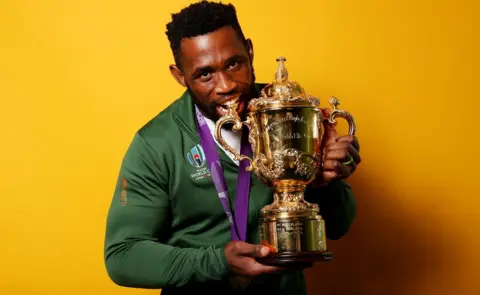 Getty Images
Getty ImagesThis week, in one of South Africa's poorest communities, work starts on a new rugby field for children to play on.
On its own, the field at Mbekweni Youth Centre near Cape Town might not feel very significant. But for South Africa's first black rugby captain, Siya Kolisi, it's the start of something.
Two months on from his side's World Cup victory, the 28-year-old believes his work off the pitch is becoming as important as his work on it.
It's the celebrations which followed the Springboks' win that Kolisi wants to hold on to. He tells Radio 1 Newsbeat: "I've never seen anything like that in my lifetime. That's why we are doing lots of work to make sure it maintains and keeps on going.
"This is the momentum you've got to use. Hopefully we can do stuff right now that could mean change for decades."
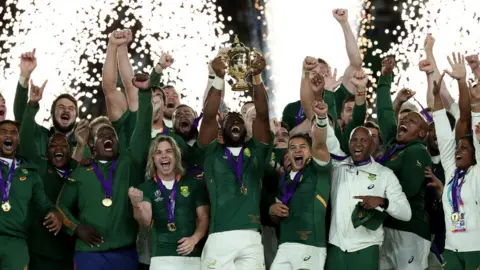 Getty Images
Getty ImagesBut he admits that it's only in the last few days that he's sat down to watch back that 32-12 victory over England.
"It was most special because of the period we are in as a country. We need it more than anyone else."
His motivation comes from his own remarkable story. Kolisi grew up in one of the most deprived parts of Port Elizabeth. He was raised by his grandmother who cleaned kitchens to ensure the family survived. He had to go to one of his first rugby trials in his boxer shorts as he didn't have proper kit.
There's more of South Africa's recent history which you need to understand to get the scale of the Kolisi story. The South African team which won the 1995 World Cup had only one black player. The 2019 team had 12 in the squad with him as captain.
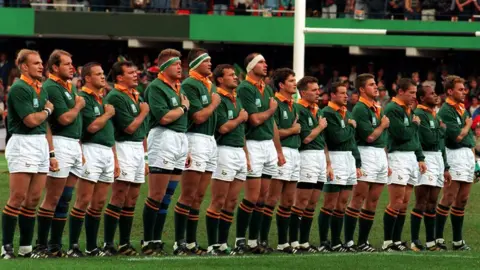 Getty Images
Getty ImagesThere's still a lot of work to be done in a country where the gap between rich and poor is so obvious - and the difference one man can make, as always, remains to be seen.
Historically, a much higher proportion of black South Africans have lived in poverty. In the first half of the last decade, the proportion of black and coloured (the term used in the country for people who are mixed-race) people in poverty increased, according to the government's own data.
"I have to do more than just play and I have the platform to do that," Kolisi said.
"Some just give financially but for me, it means a lot to me, because where I come from shaped me as the person I am today."
"I'm only doing a little bit of it. I hope it inspires other people."
This week, Radio 1 Newsbeat is reporting on the people, politics and culture of South Africa almost 30 years on from Nelson Mandela's release.
When we meet Siya, he turns up on his own and parks his car outside. There's no entourage - a bit of a surprise for one of the most recognised names in world sport right now.
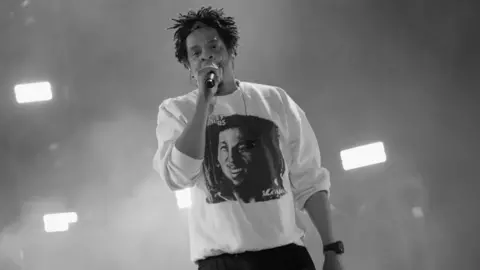 Getty Images
Getty ImagesHe's just signed up to be represented by Jay-Z's talent agency, Roc Nation, which he describes as "ridiculous".
"We listen to his music and his life is like what we grew up with - what he had to fight through. And he shares that in some of his music."
It sounds like a big moment in the Kolisi story but, for him, maybe not as big as running into Jurgen Klopp in Cape Town. Like many here, Kolisi is a huge Liverpool fan.
"I went to dinner with some friends including Faf du Plessis (the South African cricket captain), he's a very close friend of mine and he's never seen me freak out like that. I nearly fell off my chair.
"I understand why his players play for him like that - because of the person he is and how much he invests himself into other people.
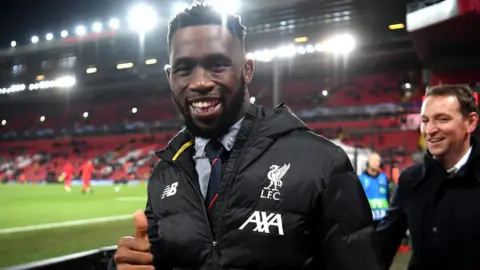 Getty Images
Getty Images"It's just like coach Rassie (South African rugby coach Rassie Erasmus). I think coach Rassie is amazing. I could see the resemblance of the two coaches. It's nice to work under him because he plays the same level as we play now and he always teaches some of his mistakes he made and the learnings and the good things he's done. I'd love to see how it'd be if they meet."
As well as the project to open sports fields, the star is supporting work to improve schools.
"I know what it feels like to not have proper rugby fields and facilities. My goal is to make sure that one day everyone has a fair opportunity and all the schools play against each other, like kids who are disadvantaged play guys from the suburbs."
He's talking football, cricket and netball as well.
"I want to start opening computer rooms and improve bathrooms too. When I was in school, you didn't want to go to the bathroom because the bathroom was so horrible, so we're hoping to change that too."
There's huge ambition from Kolisi to bring change in South Africa - a country still struggling with equality more than 25 years after the end of apartheid, the law which forced communities to live separate lives.
"I know we have challenges and everyone does but I can't sit here and complain and moan because this won't change. This is a beautiful country. In the areas where I grew up, areas are struggling - people are still happy, some are hopeful and all they want is an opportunity. I'm hoping some of us can give that opportunity.
"In everything I do, I want South Africa to be part of the conversation."
Original interview by Nesta McGregor; online write-up by Paul Stanworth


